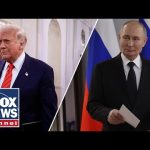In a surprising twist, President Trump has exhibited a softer approach regarding tariffs and the future of Federal Reserve Chairman Jerome Powell. Initially, Trump expressed strong dissatisfaction with Powell, claiming he wasn’t doing his job properly and hinting that he could be replaced at any moment. Just a few days later, however, Trump seemed to backtrack. He stated that firing Powell was not on his agenda after all, showcasing a marked change in tone that left many scratching their heads.
This sudden pivot could be attributed to the turbulence in the markets, which perhaps gave the White House a reality check. As stock prices fluctuated and fears of economic pain loomed, the President’s advisors likely urged him to tone down the fiery rhetoric. After all, a good leader must be flexible, especially when faced with pesky market behaviors that can swing from highs to lows faster than a kid on a seesaw.
Furthermore, the inevitable economic reality of tariffs has been recognized. Many analysts suggest that if Trump pushes too hard on tariff policies, he risks causing significant discomfort for everyday Americans. With inflation creeping in and the economy feeling the pinch, it’s no wonder that trimming back on aggressive strategies could be seen as a sign of sanity. Americans have short memories when it comes to economic woes, having barely survived previous management’s dysfunctions in dealing with trade and financial instability.
Secretary of State Scott remarked that the media has been a driving force behind the perception of instability in the markets, attributing recent minor recoveries to this hysteria. Polls suggest that public sentiment is not entirely in sync with the stock market’s wild ride, as many Americans remain concerned about inflation and their financial futures. Trust in government, particularly in a challenging economic climate, can be a fragile thing.
Moreover, the President is a businessman at heart, a seasoned dealmaker who relishes negotiations. This aspect of his personality may ultimately persuade him to strike a deal that fosters stability rather than chaos. Some insiders believe that the team around Trump had not fully anticipated the extent of the market reaction, prompting the administration to reassess its approach. The timing of announcements regarding trade agreements with nations such as Japan, South Korea, or Australia could very well be on the agenda soon.
In the end, President Trump’s recent shifts in rhetoric could be seen as a strategic recalibration in response to economic realities. While he still stands firm on the issues of trade, perhaps a softer touch is now necessary to navigate these uncertain waters. As with any good story in politics, the narrative continues to unfold, and Americans will be closely watching to see what comes next in this intriguing saga.




